Pas de biographie disponible.
Compositeur Musique additionelle Librettiste Parolier Metteur en scène Chorégraphe Producteur création Producteur version
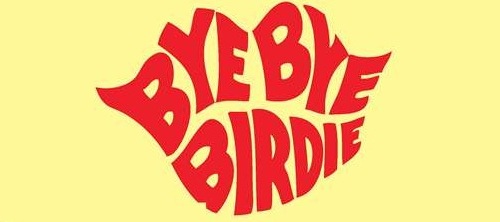
Musical
Musique: Charles Strouse • Paroles: Lee Adams • Livret: Michael Stewart • Production originale: 13 versions mentionnées
Dispo: Résumé Synopsis Génèse Liste chansons
Originally titled Let's Go Steady, the satire on American society is set in 1958. The story was inspired by the phenomenon of popular singer Elvis Presley and his draft notice into the Army in 1957. The rock star character's name, "Conrad Birdie," is word play on the name of Conway Twitty. Twitty is best remembered today for his long career as a country music star, but before that, in the late 1950s, he was one of Presley's rock 'n' roll rivals.
Genèse: The producer Edward Padula had the idea for a musical initially titled Let's Go Steady, a "happy teenage musical with a difference." Padula contracted with two writers, and Charles Strouse and Lee Adams wrote seven songs for their libretto. Padula, Strouse and Adams sought Gower Champion as director/choreographer, who until that time had choreographed only a few musicals. (Fred Astaire and Morton DaCosta had already declined.) However, Champion did not like the book and the writers were fired, with Michael Stewart then hired. Stewart wrote an early version titled Love and Kisses, which focused on a couple thinking of divorce, but whose children persuade them to stay together. Champion wanted "something more". "The 'something more' had been right there in the newspaper. On September 22, 1958, rock-and-roll idol Elvis Presley, having been drafted, boarded a ship for eighteen months in Germany.... There was a media circus including Elvis giving a specially selected member of the Women's Army Corps 'one last kiss'". After brainstorming, Stewart and Adams "came up with the idea of a rock-and-roll singer going off to the army and its effect on a group of teenagers in a small town in Ohio." The name of the singer was Elsworth, then changed to "Conway Twitty before we discovered there was already a Conway Twitty who was threatening to sue us, and then, finally, Conrad Birdie."
Résumé: The fictional story takes place in 1958, centering around Conrad Birdie, a hip-thrusting rock and roll superstar akin to Elvis Presley, Conrad's agent and songwriter, Albert Peterson, and Albert's secretary and love, Rose Alvarez (Rose Grant or Rose DeLeon in some versions), who hails from Allentown, Pennsylvania. Albert finds himself in trouble when Conrad is drafted into the army, so he and Rose come up with a last-ditch publicity stunt to premier one last hit Conrad Birdie record before he is sent to the army. They plan to have Conrad sing Peterson's new song "One Last Kiss" on live television, and give one lucky girl from his fan club a real 'one last kiss' on 'The Ed Sullivan Show' before going off to war. The lucky girl is chosen randomly from Conrad's national fan club, and it happens to be Kim MacAfee. Rose, Conrad, and Albert set off to her house in Sweet Apple, Ohio to prepare for the event. However, things don't go quite as planned; Kim's father becomes obsessed with the prospect of being on The Ed Sullivan Show alongside his daughter, Kim's boyfriend becomes disastrously jealous of Conrad, and Conrad himself becomes tired of the show business life and tries to teach the kids how to party - ultimately getting himself in trouble with the law.
Création: 14/4/1960 - Al Hirschfeld Theatre (Broadway) - représ.
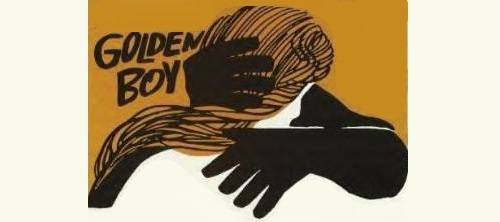
Musical
Musique: Charles Strouse • Paroles: Lee Adams • Livret: Clifford Odets • William Gibson • Production originale: 3 versions mentionnées
Dispo: Résumé Génèse Liste chansons
Genèse: Following the Detroit tryout, Odets died and Gibson was hired to rework the script. The ideals of the noble plot were abandoned in a revision in which Joe evolved into an angry man who, embittered by the constant prejudice he faces, uses his fists to fight his frustrations. His brother became a worker for CORE, and the subtle romance between Joe and the white Lorna developed into an explicit affair capped by a kiss that shocked audiences already having difficulty adjusting to a heavily urban jazz score and mentions of Malcolm X. This was a far cry from the comedies Hello, Dolly! and Funny Girl, both popular holdovers from the previous theatrical season. After twenty-five previews, the Broadway production, directed by Arthur Penn and choreographed by Donald McKayle, opened on October 20, 1964 at the Majestic Theatre, where it ran for 568 performances. In addition to Davis, the cast included Billy Daniels as Eddie Satin, Kenneth Tobey as Tom Moody, Jaimie Rogers as Lopez and Paula Wayne as Lorna Moon, with Johnny Brown, Lola Falana, Louis Gossett,Al Kirk, Baayork Lee, and Theresa Merritt in supporting roles. An original cast recording was released by Capitol Records. One song from the score, "This Is the Life", later became a hit in a cover version recorded by Matt Monro. Davis reprised his role for the 1968 West End production at the London Palladium, the first book musical ever to play in the theatre. Necco (New England Confectionary Company) created a short-lived candy bar inspired by Davis and the musical. It was called "Golden Boy".
Résumé: Joe Wellington is determined to break out of Harlem and make it as a boxer. Despite the disapproval of his family, he hooks up with a manager and after a string of losses, things start to go his way... but as he starts to win in the ring, life outside starts to spiral out of control. With Eddie Satin, the best manager there is, showing an interest in Joe, the woman of his dreams slipping out of reach and his toughest opponent yet lined up in the ring, the stage is set for the fight of his life.
Création: 20/10/1964 - Majestic Theatre (Broadway) - représ.
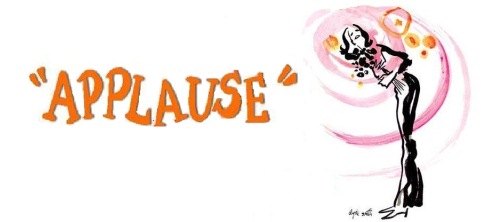
Musical
Musique: Charles Strouse • Paroles: Lee Adams • Livret: Adolph Green • Betty Comden • Production originale: 10 versions mentionnées
Dispo: Résumé Synopsis Commentaire Génèse Isnpiration Liste chansons
This musical is about show business, and the characters are typical of Broadway's glitter without being types. What is it that we're living for?", sing the impoverished "gypsies", the Broadway dancers, in Act 1 - and the answer? - "Applause, Applause". These lyrics state simply the motive of all the characters in the play; and this song is repeated periodically to remind us of the theme of the show.
Genèse: The Broadway production opened on March 30, 1970 at the Palace Theatre, and closed on July 27, 1972, after 896 performances and 4 previews. Directed and choreographed by Ron Field with the orchestrations of Philip J. Lang, the original cast included Lauren Bacall, Len Cariou, Penny Fuller, Bonnie Franklin, Lee Roy Reams, Robert Mandan, Brandon Maggart, Ann Williams, and Nicholas Dante. When Bacall's contract was up in 1971, the producers initially decided to cast film legend Rita Hayworth as Margo. Hayworth was very interested and flew to New York to audition for the role. However, unbeknownst to anyone at the time, Hayworth was suffering from the beginning stages of Alzheimer's disease and could not retain lyrics or dialogue. Ironically, Anne Baxter, who had portrayed Eve in the original film, replaced Bacall as Margo Channing. When Baxter departed the show in 1972, actress Arlene Dahl replaced her for one month before the show closed. The musical was later adapted for television, starring Bacall, with Larry Hagman replacing Len Cariou in the role of Bill Sampson. It aired in the United States on CBS on March 19, 1973. It has not been released commercially, but it is available for viewing at the Paley Center for Media (formerly The Museum of Television & Radio) in New York City and Beverly Hills, California. New York City Center's Encores! presented a new production of Applause February 7 to 10, 2008. It was directed by Kathleen Marshall and starred Christine Ebersole, Michael Park, Erin Davie, Megan Sikora, Mario Cantone, Tom Hewitt, Chip Zien, and Kate Burton.
Résumé: A la fin des années '60, Margo Channing est une star de Broadway. Mais, en secret, elle est parano au sujet de son âge. C'est alors qu'une jeune fille ambitieuse, Eve, débarque dans sa vie. Très vite, cette jeune fille admirative va devenir la plus grande ennemie de Margo et entrer en compétition avec elle. Eve devient l'understudy de Margo et décide de la sapper complètement afin qu'elle puisse jouer le rôle devant les critiques. A la fin, Eve est devenue une star et la carrière de Margo se fane. Cependant, Margo se rend compte qu'elle peut trouver encore le bonheur … auprès de l'homme qu'elle aime, Bill.
Création: 30/3/1970 - Palace Theatre (Broadway) - représ.

Musical
Musique: Charles Strouse • Paroles: Martin Charnin • Livret: Thomas Meehan • Production originale: 23 versions mentionnées
Dispo: Résumé Synopsis Commentaire Génèse Isnpiration Liste chansons
Genèse: Pre-Broadway tryout) Annie had its World premiere on August 10, 1976 at the Goodspeed Opera House in East Haddam, Connecticut. Kristen Vigard was the first actress to play the title role. However, the producers soon decided that Vigard's genuinely sweet interpretation was not tough enough for the street-smart orphan. After a week of performances, Vigard was replaced by Andrea McArdle, who played one of the other orphans, Pepper. Vigard went on to become McArdle's Broadway understudy. Broadway original The original Broadway production opened at the Alvin Theatre on April 21, 1977 and starred Andrea McArdle as Annie, Reid Shelton as Daddy Warbucks, Dorothy Loudon as Miss Hannigan, and Sandy Faison as Grace Farrell. Danielle Brisebois was one of the orphans. It was nominated for eleven Tony Awards and won seven, including the Best Musical, Best Score, and Best Book. Replacements in the title role on Broadway included then-child actors Shelly Bruce, Sarah Jessica Parker, Allison Smith and Alyson Kirk. Replacements in the role of Miss Hannigan included Alice Ghostly, Dolores Wilson, Betty Hutton, Marcia Lewis, and June Havoc. The show closed on January 2, 1983, after a total of 2,377 performances, setting a record for the longest running show at the Alvin Theatre (now the Neil Simon Theatre), until it was surpassed by Hairspray in 2009. United States National touring companies During the Broadway run of Annie, there were four touring companies that were launched from the original production to tour to major U.S. cities: The 1st National Touring Company opened in Toronto in March 1978 with Kathy-Jo Kelly in the title role, Norwood Smith as Daddy Warbucks, Jane Connell and Ruth Kobart as Miss Hannigan and Gary Beach as Rooster. It played in Miami from April 12 to May 13, 1978 then continued for a few more cities until it landed in Chicago where it played for 32 weeks. In April 1979, it continued on the road in with Mary K. Lombardi now in the lead as Annie. In the fall of 1980, Theda Stemler took over the part and was replaced in Boston when she grew too old. On May 15, 1981, Louanne Sirota, who had played Annie in the long-running Los Angeles production (see below), took over the role for four months. In August 1981, Becky Snyder became the company's last Annie, closing the tour on September 6, 1981. The 2nd National Touring Company (sometimes referred to as the West Coast or Los Angeles Production) opened in San Francisco on June 22, 1978 with Patricia Ann Patts starring as Annie and the then-unknown Molly Ringwald playing one of the orphans. The show landed in Los Angeles on October 15, 1978 for an open-ended run at the Shubert Theatre. On June 12, 1979, Sirota, just 9 years old (up until that time, all Annies had been 11 years old), took over the role from Patts. Marisa Morell took the role in December 1979, closing the Los Angeles run and continuing on tour with the show through December 1980.Kristi Coombs then played Annie until this touring company closed in Philadelphia on January 23, 1982. Alyssa Milano played one of the orphans in 1981. The 3rd National Touring Company opened in Dallas on October 3, 1979 with Roseanne Sorrentino in the title role. This company toured to 23 cities playing mostly shorter runs of a month or less. On March 27, 1981, Bridget Walsh took over as Annie. Becky Snyder (who had closed the 1st National Tour) joined this company in the summer of 1982 and stayed with it until it closed in September of that year. The 4th National Touring Company opened on September 11, 1981 with Mollie Hall playing Annie. This production was a "bus and truck" tour, with a slightly reduced cast, that traveled the country and often played in two cities a week. This company was still touring when the original Broadway production closed in January 1983, making Kathleen Sisk the final performer to play Annie from the original production team. This tour closed in September 1983. West End original The musical premiered in the West End at the Victoria Palace Theatre on 3 May 1978. Though Andrea McArdle played the title role for 40 performances, British 12-year-old Ann Marie Gwatkin was also cast in the title role and appeared on the Original London cast recording. She alternated with Christine Hyland and five other Annies were cast at this point: Anne O'Rourke, Tracy Taylor, Jacinta Whyte, Helen Thorne and Gillian White, who were all to play the role over the next three years. Miss Hannigan was originally played by Sheila Hancock, and later by Maria Charles and Stella Moray; Daddy Warbucks was played by Stratford Johns and later by Charles West, with Deborah Clarke playing Pepper. Annie closed on 28 November 1981, after 1485 performances. UK tour The musical transferred to the Bristol Hippodrome for a special Christmas season before touring Britain. Because of strict British employment laws for juvenile actors, a succession of actresses took on the lead role every four months. One of the last girls to perform the role at the Victoria Palace before the show went on tour was 10-year old Claudia Bradley from Leeds who was featured on a 1981 BBC programme called Fame. West End revival (1998) The show was revived at the Victoria Palace, running from 30 September 1998 to 28 February 1999. It starred Lesley Joseph and then Lily Savage (the female alter ego of comedian Paul O'Grady) as Miss Hannigan and Kevin Colson as Warbucks. Further UK tours of the show were also staged, including a one-month run at The Theatre Royal in Lincoln in 2001. Members of the original cast included Annie's Kate Winney and Jemma Carlisle, Louise English (Grace), Vicki Michelle (Hannigan) and Simon Masterton-Smith (Warbucks). The show proved to be a success, and so for the first two tours and the Malaysian Genting Highlands Production, the role of Annie was then shared by Faye Spittlehouse and a young Lucy May Barker. This particular production toured from 2001–2007 and resumed in September 2008. Broadway revival (1997) A 20th anniversary Broadway revival in 1997 entitled Annie, the 20th Anniversary starred Nell Carter, and later Sally Struthers, as Miss Hannigan, but controversy surrounded the casting of the titular character. The original actress cast in the role, Joanna Pacitti, was fired and replaced by her understudy, Brittny Kissinger (who usually played July) while battling bronchitis. Public sentiment seemed to side with Pacitti as she was the winner of a highly-publicized contest to find a new Annie sponsored by the department store Macy's. This incident, coupled with the mixed reviews the new staging garnered, doomed it to a short run, although it was followed by a successful national tour. Kissinger, then 8, became the youngest actress to ever play Annie on Broadway. More controversy surrounding the show involved Nell Carter. Carter reportedly was very upset when commercials promoting the show used a different actress, Marcia Lewis, a white actress, as Miss Hannigan. The producers claimed that the commercials, which were made during an earlier production, were too costly to reshoot. Carter felt that racism played a part in the decision. "Maybe they don't want audiences to know Nell Carter is black", she told the New York Post. However, the ads did mention that Carter was in the show. "It hurts a lot", Carter told the Post, "I've asked them nicely to stop it — it's insulting to me as a black woman."[citation needed] Later reports stated that "Nell Carter of Broadway's’Annie' denied Thursday that she called her show's producers racist because they chose to air commercials featuring a previous Miss Hannigan--who is white--instead of her." Her statement, released by the Associated Press, read: " 'Yes, it is true that I and my representatives have gone to management on more than one occasion about the commercial and were told that there was nothing they could do about it,' Carter said in a statement Thursday. 'Therefore, I have resigned myself to the fact that this is the way it is.' The statement also addressed the alleged charges of racism, first published in Thursday's New York Post. Carter is black. 'I, Nell Carter, never, ever, ever accused my producers or anyone in the show of racism,' she said. Producers have said it is too expensive to film a new commercial." Carter was later replaced by another white actress, Sally Struthers.
Résumé: En 1933, apogée dramatique de la Dépression, les petites filles d'un orphelinat de New York sont copieusement maltraitées par la directrice du lieu, une poivrote délirante issue d'une famille peu recommandable. Annie est la plus astucieuse des gamines et se débrouille très bien pour être choisie par la secrétaire d'un richissime républicain qui veut accomplir sa BA annuelle en abreuvant de ses richesses et de son pouvoir un pauvre enfant démuni - pendant une semaine entière ! Il ne faut pas plus de temps à l'adorable Annie (et à ses copines restées en prison) pour : se faire adorer par toute la maisonnée, rencontrer le Président des USA (et madame), convaincre son protecteur de la pertinence du New Deal dudit Président, le rendre vaguement démocrate par la même occasion, démasquer le propre frère de la directrice (du pénitencier pour gamines) accompagné d'une sotte hystérique qui se faisaient passer pour les parents repentis d'Annie afin d'empocher la somme rondelette que le protecteur leur propose (pour qu'ils reprennent leur fille ou pour que lui-même la garde, ce n'est pas très clair), et enfin pour se faire adopter (à priori avec toutes ses soeurs de misère) par le coffre-fort humain qui en profite pour s'amouracher de sa secrétaire qui se retrouve le temps d'une chanson maman de 14 fillettes…
Création: 21/4/1977 - Neil Simon Theatre (Broadway) - représ.

Musical
Musique: Charles Strouse • Paroles: Lee Adams • Livret: William Brown • Production originale: 1 version mentionnée
Dispo: Résumé Génèse Liste chansons
Genèse: The creators hoped that the backstage story about the making of a musical would cash in on the success of A Chorus Line as well as the popularity of the black-themed musical, including Brown's own The Wiz, which was still running at the time. But Brown's much-criticized book is a clichéd spoof of show business lawyers, idealistic young playwrights, glitzy Las Vegas performers, blue-haired matinée ladies, and the black-themed musical itself. The Wiz proved to be Brown's only success. Following a dismal October–November tryout with Helen Gallagher and Julius LaRosa at the theatre in the Riverside Church in Morningside Heights, the producers fired most of the cast and creative personnel, including director/choreographer George Faison. Gower Champion was called in to rescue the Broadway-bound production with only a month to go, but he feared that the show's defects were too serious to remedy and insisted on receiving a "Production supervised by" credit only. After 14 previews, the Broadway production opened and closed at the Lunt-Fontanne Theatre on December 21, 1978. It lost $1 million.[3] The cast included Patti Karr (replacing Gallagher), Alan Weeks, Larry Marshall, Warren Berlinger (replacing LaRosa), Loretta Devine, Jackée Harry, and Tiger Haynes. Julius Novick of The Village Voice called it "the best Broadway musical since Platinum," a disaster that had opened the month before. Critic and theatre historian Ken Mandelbaum has described the show as "a genuine turkey... hopeless... [a] well-meaning but fatally underpowered evening. The Charles Strouse-Lee Adams score had its moments...." A cast album was recorded before an audience during a live performance in December 1978.
Résumé: Backstage story about a white producer's misguided effort to create a musical based on a play written by a black author.
Création: 21/12/1978 - Lunt-Fontanne Theatre (Broadway) - 1 représ.

Musical
Musique: Charles Strouse • Paroles: Charles Strouse • Livret: Charles Strouse • Production originale: 1 version mentionnée
Dispo: Synopsis Génèse Liste chansons
Genèse: The work premiered at the Buxton Festival and then in London at the Lyric Hammersmith beginning on December 18, 1982 with a cast including Sarah Brightman as the title character, Nightingale. In the U.S. a staged reading of the show was given by the First All Children's Theatre in New York in May 1982.[1] The group then gave a preview of the work in New York in March 1983 before the North American premiere at "The Barns" at Wolf Trap, Wolf Trap, Virginia, in April 1983.[2] Since then, the show has been performed numerous times throughout the world.
Résumé:
Création: 18/12/1982 - Lyric Hammersmith Main House (Londres) - représ.
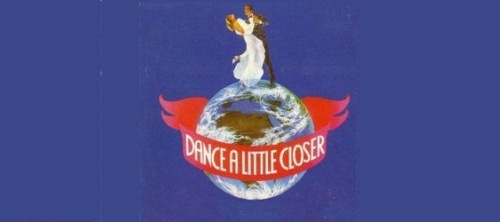
Musical
Musique: Charles Strouse • Paroles: Alan Jay Lerner • Livret: Alan Jay Lerner • Production originale: 1 version mentionnée
Dispo: Résumé Synopsis Génèse Isnpiration Liste chansons
Genèse: The musical opened on Broadway at the Minskoff Theatre on May 11, 1983, where it closed after one performance and twenty-five previews. Directed by Lerner and choreographed by Billy Wilson, the cast included Len Cariou, Liz Robertson, George Rose, Don Chastain, Brent Barrett, and Alyson Reed. Showbusiness insiders dubbed it "Dance a Little Faster...Close a Little Sooner." In his New York Times review Frank Rich described it as "a huge, extravagant mishmash . . . that seems to have taken on a rampaging, self-destructive life of its own," a sentiment similar to those expressed by the other critics. An original cast recording is available on CD.
Résumé: Harry Aikens, a down-at-heel supper club entertainer warms again to an old flame, Cynthia Brookfield-Bailey, when they are both ensconced in an Austrian hotel on New Year's Eve awaiting World War III. Cynthia was the mistress of a man who bore a remarkable resemblance to the American diplomat, Henry Kissinger.
Création: 11/5/1983 - Minskoff Theatre (Broadway) - représ.
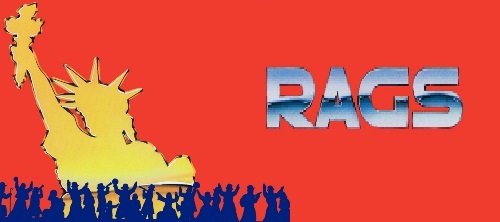
Musical
Musique: Charles Strouse • Paroles: Stephen Schwartz • Livret: Joseph Stein • Production originale: 5 versions mentionnées
Dispo: Résumé Synopsis Génèse Liste chansons
Genèse: The Broadway production opened on August 21, 1986 at the Mark Hellinger Theatre with little advance sale and to mostly indifferent reviews, and it closed after only four performances (and 18 previews). Directed by Gene Saks and choreographed by Ron Field, the cast included Teresa Stratas as Rebecca Hershkowitz, Larry Kert as Nathan Hershkowitz, Lonny Price as Ben, Judy Kuhn as Bella Cohen, Dick Latessa as Avram Cohen, Marcia Lewis as Rachel Halpern, and Terrence Mann as Saul, a union organizer. Despite its failure, it garnered a good deal of attention during the awards season. In 1991, Sony released a studio recording of the score. It featured most of the original cast joined by Julia Migenes replacing Stratas. Revised versions In 1991 the creators reunited to present a dramatically rewritten and severely streamlined production at The American Jewish Theatre, New York City, directed by Richard Sabellico. The version had 9 actors playing all of the roles, and a reduced set, with two pushcarts on stage and imaginary windows, with the actors describing the exterior activity. The young immigrant mother has a best friend of almost equal importance, and the story is now told by David, the heroine's young son. The Colony Theatre Company, Los Angeles, California presented Rags in 1993. They reworked the show again, staging it first at Florida's Coconut Grove Playhouse (February 1999) and then the Paper Mill Playhouse in New Jersey in November 1999. The revised version cut the cast to 15, from the original Broadway cast of 30. According to Strouse, "We tried to do too much.And now it's tightened, more focused. People got lost in it...The diffuse, scattered story now centers on Rebecca Hershkowitz, a young immigrant mother who escapes to the Lower East Side after a pogrom, and her love affair with Saul, an American labor organizer trying to unionize the sweatshop where she works...The [original] score was influenced by Middle Eastern, Irish, Scottish, English folk, American honky-tonk, obviously jazz and ragtime and klezmer -- even Greek music of that day, and Broadway, too...It is now 'more impressionistic'." In 2006, Schwartz, Stein and Strouse collaborated on the World AIDS Day Concert version of the musical, celebrating the 20th Anniversary of the show's Broadway opening. The concert was at Times Square's Nokia Theatre and featured Carolee Carmello, Gregg Edelman, Eden Espinosa, Lainie Kazan and Michael Rupert.
Résumé: With great passion and humor, the story is told of Rebecca, a naive Russian immigrant arriving at Ellis Island with her young son, and their struggle to make a life for themselves in the New World. She goes to work in a sweatshop while searching for her husband who has preceded them to America. When they are finally reunited she discovers that his assimilation is not entirely for the best. His desire to change their name and strip away their ethnic culture so as to fit in with his cronies distresses Rebecca, whose gradual enlightenment leads her into union activities against the very men her husband so hopes to impress. Subplots concern an elderly immigrant, his daughter, and their respective romances, one of which ends tragically. This sweeping saga of awakenings and disappointments, of greed and power, of strength and love is as deeply moving and inspirational a musical as you could hope to present.
Création: 21/8/1986 - Mark Hellinger Theatre (Broadway) - représ.
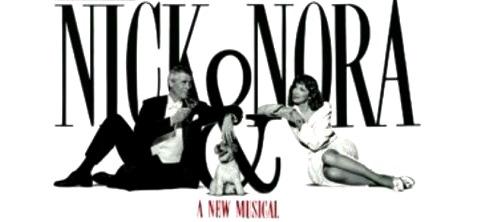
Musical
Musique: Charles Strouse • Paroles: Richard Jr Maltby • Livret: Arthur Laurents • Production originale: 1 version mentionnée
Dispo: Résumé Génèse Liste chansons
Genèse: Citing high costs, the producers opted to replace out-of-town tryouts (originally scheduled for the Mechanic Theatre, Baltimore, Maryland) with a longer than usual nine-week preview period of 71 previews in New York City. During this time the musical underwent extensive script rewrites, multiple song replacements, and a major cast change. (It was surpassed by a record of 15 weeks of previews for the Broadway musical Spider-Man: Turn Off the Dark which finally opened on Broadway in June 2011.) The Broadway production, directed by Laurents and choreographed by Tina Paul, finally opened on December 8, 1991 at the Marquis Theatre where, unable to overcome the bad publicity and brutal reviews, it ran for only nine performances. The cast included Barry Bostwick (Nick Charles), Joanna Gleason (Nora Charles), Christine Baranski, Debra Monk, Faith Prince, and Chris Sarandon. The show was nominated for the Tony Award for Best Original Score. An original cast recording was released on That's Entertainment Records (TER), and was re-released on Jay Records in 1997. In his memoir Original Story By, Laurents confessed he didn't realize until the show was in previews that the characters of Nick and Nora Charles were identified so closely with William Powell and Myrna Loy that the public would have difficulty accepting anyone else in the roles. He also felt the lengthy preview period, during which theatre gossips and newspaper columnists spread largely unfounded rumors about the show's mounting problems, helped destroy any chances of success it may have had.
Résumé: The plot involves witty and urbane high society couple Nick and Nora Charles, characters created by Dashiell Hammett in his novel The Thin Man, which inspired six films, a radio show, and a television series. In this version, the two are attempting to solve the murder of a bookkeeper on a film production in Hollywood. Crucially, the musical departs from the formula of previous incarnations, defined by the chemistry between Nick and Nora, by creating a subplot of marital woes and tensions between them.
Création: 8/12/1991 - Marquis Theatre (Broadway) - 9 représ.

